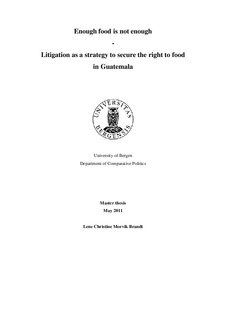Enough food is not enough - Litigation as a strategy to secure the right to food
Master thesis
Permanent lenke
http://hdl.handle.net/11250/2474732Utgivelsesdato
2011-10-28Metadata
Vis full innførselSamlinger
- Publications [1488]
Originalversjon
Master thesis in Comparative Politics. Bergen: University of Bergen 106 p.Sammendrag
This thesis aims to investigate the conditions for legal enforcement of the right to food in Guatemala. In recent years there has been an increase in the phenomenon of protecting social rights through the legal opportunity structures and public interest litigation. As the right to food is frequently being violated in Guatemala, the country has both national and international legal obligations concerning the right to food, and there has been litigation on other economic, social and cultural rights, the tools for litigation appears to be in place. Yet, food rights litigation has not taken place. The research question of this paper is therefore: which factors and conditions would have to be present for there to arise public interest litigation on the right to food in Guatemala? As there has been little research conducted on food rights litigation in Guatemala, this is an explorative case study. By utilizing an analytical framework developed to study social rights litigation, the paper is strongly theory-driven. The paper relies on multiple sources of evidence: secondary literature and research, and official documents are the most important. The thesis reveals that there are many obstacles to food rights litigation. The factors that would make public interest litigation on the right to food more likely concern both conditions influencing the formulation of food rights claims and courts‟ responsiveness to such social rights claims. The analysis concludes that the most crucial factors for food rights litigation to arise in Guatemala include: more information and awareness around the right to food; better legal assistance and interpreter services; more trust in, and respect for, the legal system; a stronger focus on litigation strategies by civil society and advocacy groups; less strict standing rules; reduction of legal formalities; more innovative judges; and a heightened sensitization of judges to the concerns of the hungry and malnourished. These result
